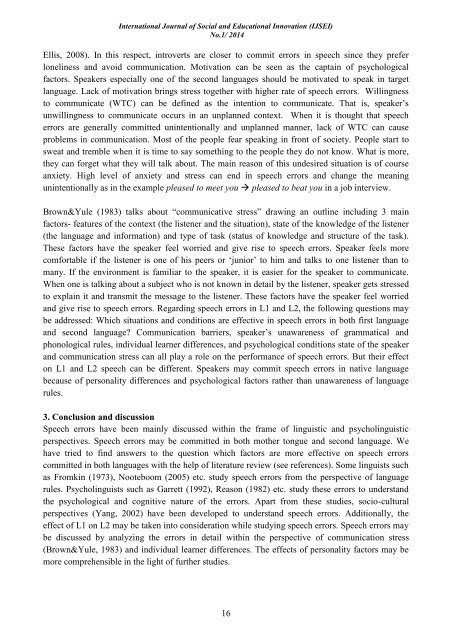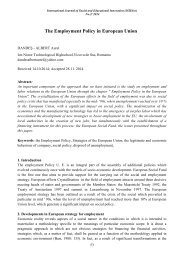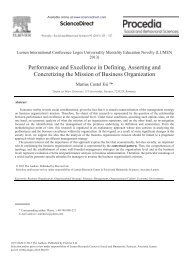International Journal of Social and Educational Innovation (IJSEI)
International Journal of Social and Educational Innovation (IJSEI) publishes research paper in the field of: Social Science and Humanities, Education, Psychology, Philosophy, Logics, Ontology and Philosophy of Science, Political Science, History, Sociology, Business and Marketing, Economics, Financial Development, Accounting, Banking, Management, Human Resources, Law, Public Administration Environmental Studies, Climate Change, Educational Technology, Language and Linguistics and so on. All papers which will be sent for evaluation/ publishing must contain educational approaches.
International Journal of Social and Educational Innovation (IJSEI) publishes research paper in the field of: Social Science and Humanities, Education, Psychology, Philosophy, Logics, Ontology and Philosophy of Science, Political Science, History, Sociology, Business and Marketing, Economics, Financial Development, Accounting, Banking, Management, Human Resources, Law, Public Administration Environmental Studies, Climate Change, Educational Technology, Language and Linguistics and so on.
All papers which will be sent for evaluation/ publishing must contain educational approaches.
You also want an ePaper? Increase the reach of your titles
YUMPU automatically turns print PDFs into web optimized ePapers that Google loves.
<strong>International</strong> <strong>Journal</strong> <strong>of</strong> <strong>Social</strong> <strong>and</strong> <strong>Educational</strong> <strong>Innovation</strong> (<strong>IJSEI</strong>)<br />
No.1/ 2014<br />
Ellis, 2008). In this respect, introverts are closer to commit errors in speech since they prefer<br />
loneliness <strong>and</strong> avoid communication. Motivation can be seen as the captain <strong>of</strong> psychological<br />
factors. Speakers especially one <strong>of</strong> the second languages should be motivated to speak in target<br />
language. Lack <strong>of</strong> motivation brings stress together with higher rate <strong>of</strong> speech errors. Willingness<br />
to communicate (WTC) can be defined as the intention to communicate. That is, speaker‘s<br />
unwillingness to communicate occurs in an unplanned context. When it is thought that speech<br />
errors are generally committed unintentionally <strong>and</strong> unplanned manner, lack <strong>of</strong> WTC can cause<br />
problems in communication. Most <strong>of</strong> the people fear speaking in front <strong>of</strong> society. People start to<br />
sweat <strong>and</strong> tremble when it is time to say something to the people they do not know. What is more,<br />
they can forget what they will talk about. The main reason <strong>of</strong> this undesired situation is <strong>of</strong> course<br />
anxiety. High level <strong>of</strong> anxiety <strong>and</strong> stress can end in speech errors <strong>and</strong> change the meaning<br />
unintentionally as in the example pleased to meet you pleased to beat you in a job interview.<br />
Brown&Yule (1983) talks about ―communicative stress‖ drawing an outline including 3 main<br />
factors- features <strong>of</strong> the context (the listener <strong>and</strong> the situation), state <strong>of</strong> the knowledge <strong>of</strong> the listener<br />
(the language <strong>and</strong> information) <strong>and</strong> type <strong>of</strong> task (status <strong>of</strong> knowledge <strong>and</strong> structure <strong>of</strong> the task).<br />
These factors have the speaker feel worried <strong>and</strong> give rise to speech errors. Speaker feels more<br />
comfortable if the listener is one <strong>of</strong> his peers or ‗junior‘ to him <strong>and</strong> talks to one listener than to<br />
many. If the environment is familiar to the speaker, it is easier for the speaker to communicate.<br />
When one is talking about a subject who is not known in detail by the listener, speaker gets stressed<br />
to explain it <strong>and</strong> transmit the message to the listener. These factors have the speaker feel worried<br />
<strong>and</strong> give rise to speech errors. Regarding speech errors in L1 <strong>and</strong> L2, the following questions may<br />
be addressed: Which situations <strong>and</strong> conditions are effective in speech errors in both first language<br />
<strong>and</strong> second language? Communication barriers, speaker‘s unawareness <strong>of</strong> grammatical <strong>and</strong><br />
phonological rules, individual learner differences, <strong>and</strong> psychological conditions state <strong>of</strong> the speaker<br />
<strong>and</strong> communication stress can all play a role on the performance <strong>of</strong> speech errors. But their effect<br />
on L1 <strong>and</strong> L2 speech can be different. Speakers may commit speech errors in native language<br />
because <strong>of</strong> personality differences <strong>and</strong> psychological factors rather than unawareness <strong>of</strong> language<br />
rules.<br />
3. Conclusion <strong>and</strong> discussion<br />
Speech errors have been mainly discussed within the frame <strong>of</strong> linguistic <strong>and</strong> psycholinguistic<br />
perspectives. Speech errors may be committed in both mother tongue <strong>and</strong> second language. We<br />
have tried to find answers to the question which factors are more effective on speech errors<br />
committed in both languages with the help <strong>of</strong> literature review (see references). Some linguists such<br />
as Fromkin (1973), Nooteboom (2005) etc. study speech errors from the perspective <strong>of</strong> language<br />
rules. Psycholinguists such as Garrett (1992), Reason (1982) etc. study these errors to underst<strong>and</strong><br />
the psychological <strong>and</strong> cognitive nature <strong>of</strong> the errors. Apart from these studies, socio-cultural<br />
perspectives (Yang, 2002) have been developed to underst<strong>and</strong> speech errors. Additionally, the<br />
effect <strong>of</strong> L1 on L2 may be taken into consideration while studying speech errors. Speech errors may<br />
be discussed by analyzing the errors in detail within the perspective <strong>of</strong> communication stress<br />
(Brown&Yule, 1983) <strong>and</strong> individual learner differences. The effects <strong>of</strong> personality factors may be<br />
more comprehensible in the light <strong>of</strong> further studies.<br />
16





